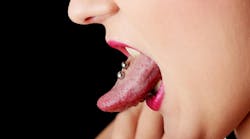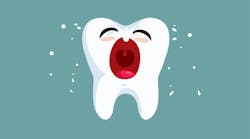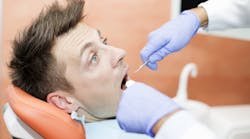Body modifications, especially piercings, have become commonplace over the past few years; it's no longer out of the ordinary to see someone-especially a young person-with multiple earlobe piercings or a septum ring.
Amidst the growing popularity of facial piercings in the US,1 it's important to question the safety of their placement. What about the ones that may affect a person's oral health, like tongue piercings? Since they're directly embedded into the flesh of a person's tongue, they come in contact with saliva, food, and everything else that may enter the mouth.
So, are tongue piercings safe, or do they run the risk of damaging teeth and disrupting the oral microbiome?
Are tongue piercings unsafe?
Some people opt for hoops, rings, or barbells, but a stud is the most common type of tongue piercing-which is essentially a rod with a metal sphere at both ends. All tongue piercings are typically made of metals like stainless steel, gold, or titanium.2
Although going to a credible studio or piercing shop is the safest way to have any body modification done, the ADA actually advises against any sort of oral piercing, claiming the negative health risks outweigh any potential esthetic benefit.3
However, that has not and will not stop patients from getting oral piercings, which is why it's important to understand the risks that come along with getting one-many patients are not fully informed about the drawbacks and consequences of getting their tongue pierced. Similarly, many dental practitioners also lack the knowledge necessary to educate and treat patients with oral piercings.1
Risks associated with tongue piercings
Even if tongue piercings are properly cared for, they still pose a direct and indirect risk to soft and hard oral and perioral tissues.1
Tooth damage
Whether we're eating, drinking, or speaking, our tongues are constantly moving around in our mouths. For those with their tongues pierced, this means the stud (or other type of jewelry) can catch or knock against the back of the teeth. Over time, this can expose the dentin, pulp, or even the nerves of the tooth, which can be extremely painful.2
Infection
Furthermore, a tongue piercing can also increase the risk of developing bacteria in the mouth, especially during the healing process. This excess bacterium may lead to dental problems such as increased amounts of plaque and a higher chance of developing gum disease. An improperly cleaned needle or unsterilized jewelry can also transmit conditions such as tetanus and HIV.4
Recession
Tongue piercings may also lead to gingival recession, which may appear on the labial aspect of the lower central incisors or the lingual aspect of mandibular central incisors-however, one study noted that recession typically does not occur before two years after having the piercing done.1
Redness, swelling, and skin irritation are other possible side effects of having an oral piercing.
Helping patients stay safe
Despite the risks, there are ways to help patients protect their oral health. They can:
• Brush twice a day with a soft-bristle toothbrush.
• Floss daily.
• Use an alcohol-free mouth rinse during and after the healing process.
• Keep the site of the piercing clean.
• Monitor for signs of an oral infection (swelling, pain, tenderness, or discharge).2
Although tongue piercings can be a form of self-expression, making sure patients understand their potential risks and helping them take preventive oral care measures can minimize health complications.
References
-
Plastargias I, Sakellari D. The consequences of tongue piercing on oral and periodontal tissues. ISRN Dent. 2014;2014:876510. doi: 10.1155/2014/876510
-
Are tongue piercings bad for your teeth? Colgate. January 2023. https://www.colgate.com/en-us/oral-health/threats-to-dental-health/tongue-piercing-rings-dental-health
-
Oral piercing/jewelry. American Dental Association. Updated August 2022. https://www.ada.org/resources/ada-library/oral-health-topics/oral-piercing-jewelry
-
The healing process of a tongue piercing. Medical News Today. Medically reviewed January 2020. https://www.medicalnewstoday.com/articles/327479#risks








